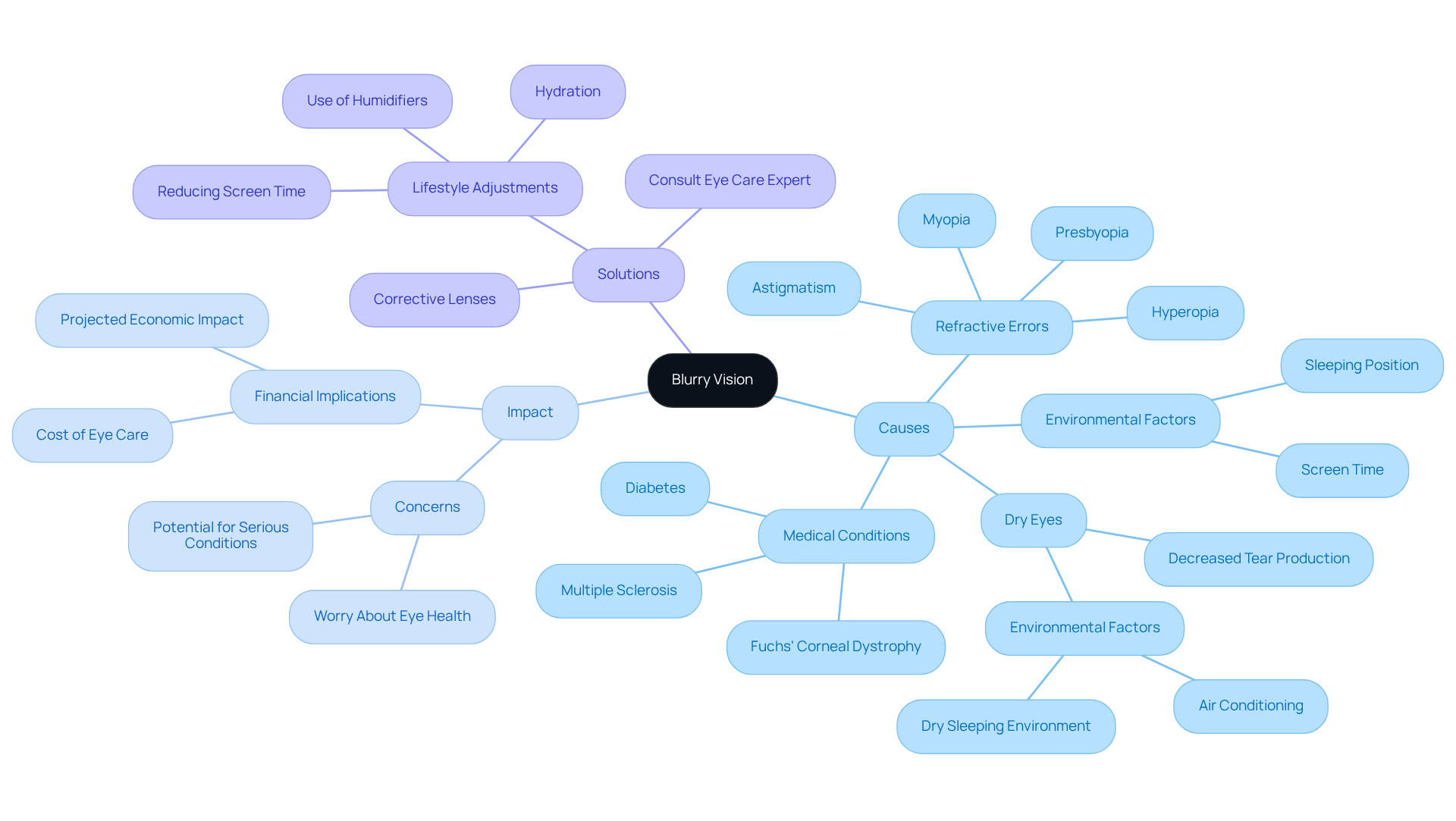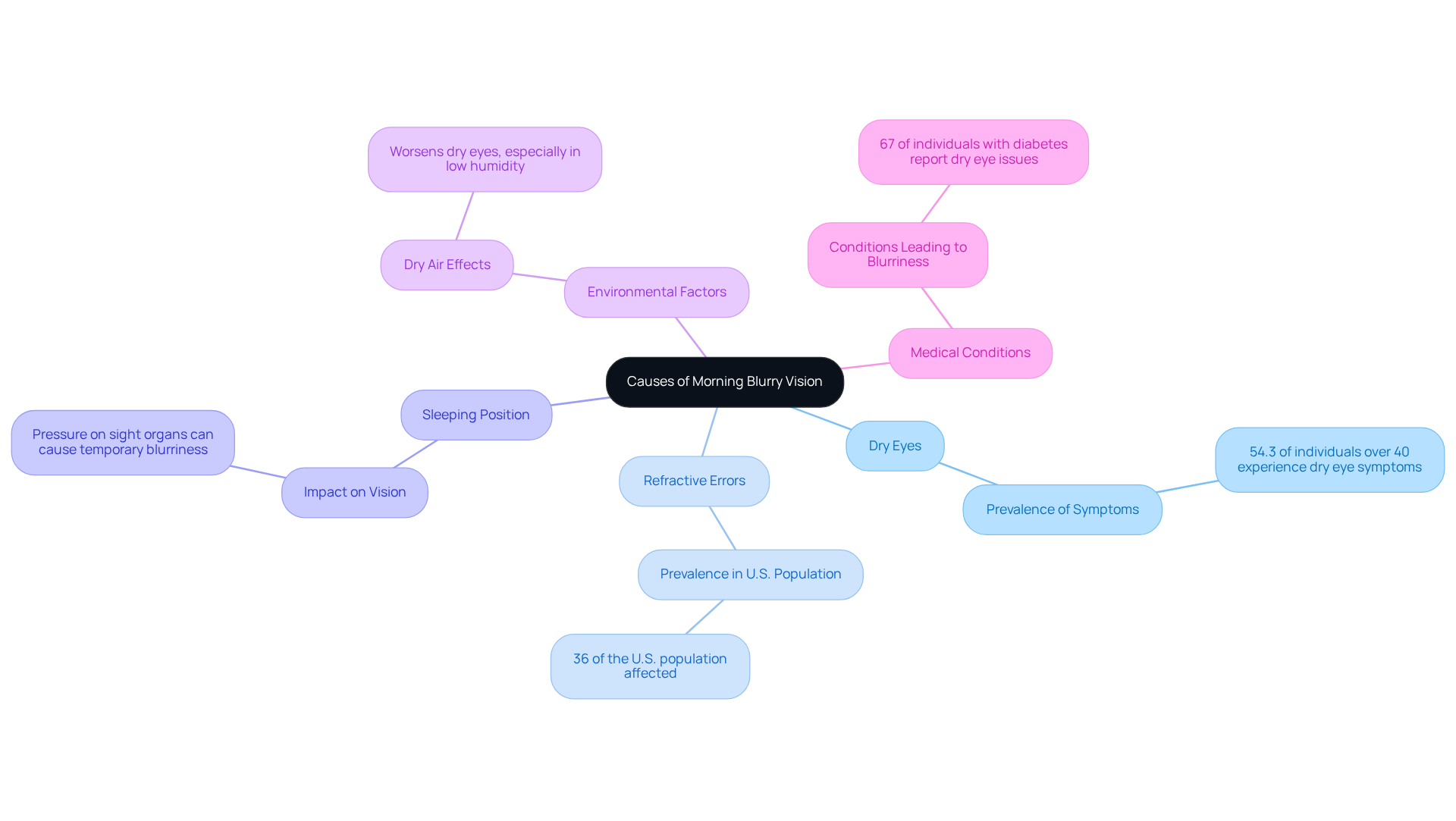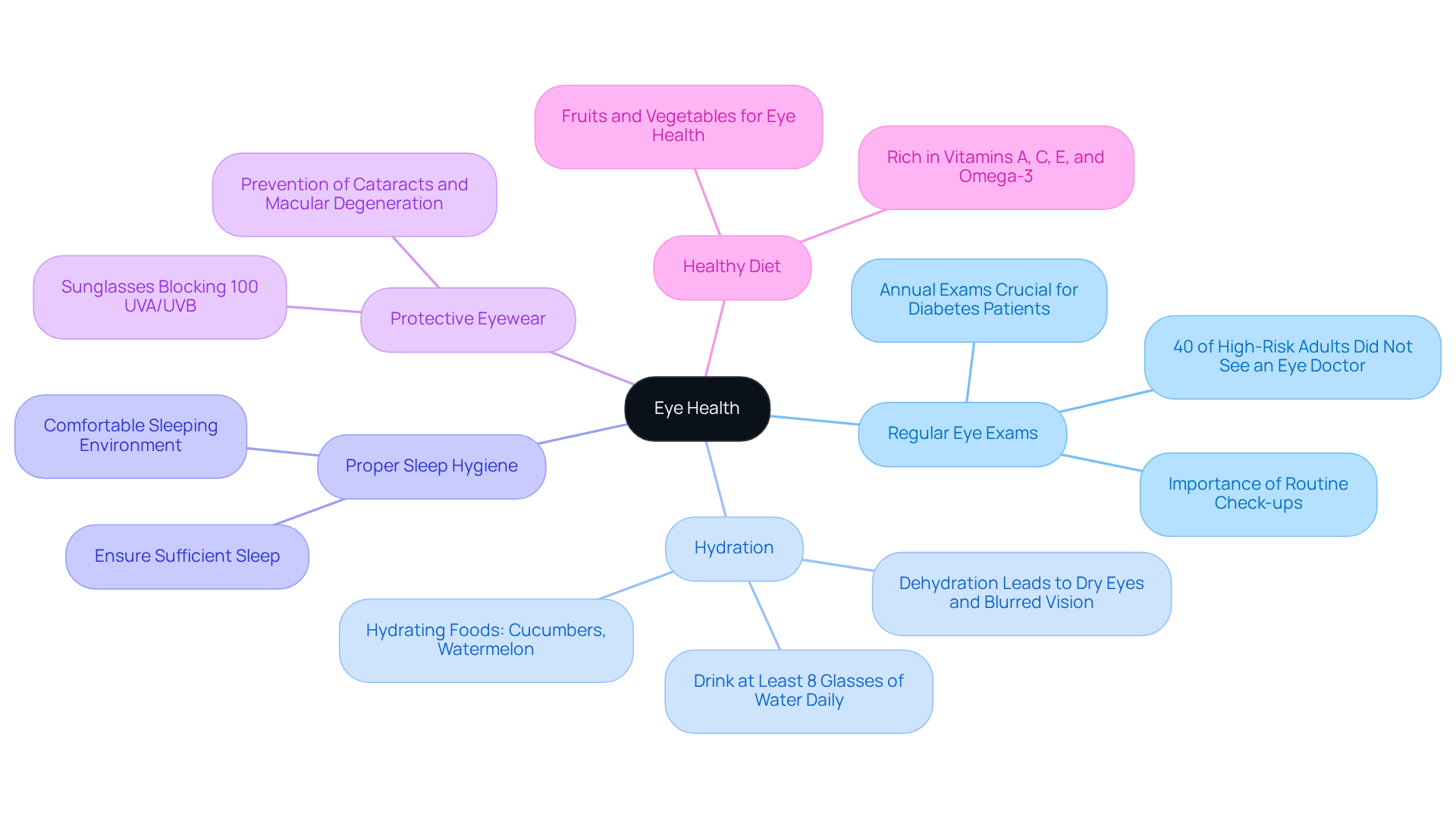Posted by: Northwest Eye in General on October 6, 2025
Overview
Experiencing blurry vision in the morning can be concerning. It may stem from various factors such as:
- Dry eyes
- Refractive errors
- Environmental conditions
While these issues can be common, persistent blurry vision might indicate underlying health concerns. We understand how unsettling this can feel, and it’s essential to recognize these symptoms.
It’s important to seek medical advice if you notice ongoing blurry vision. This could be a sign of more serious conditions that require timely intervention. Remember, you are not alone in this journey. Many have faced similar challenges, and there is support available. By reaching out for care, you take a vital step toward ensuring your health and well-being.
Introduction
Waking up to blurry vision can be a concerning experience, often leaving you feeling unsettled and questioning what might be causing it. This common issue can stem from several factors, such as:
- Refractive errors
- Dry eyes
- More serious health conditions
It’s important to recognize that around 93 million adults are at high risk for significant vision loss, yet many remain unaware of the critical need to address persistent blurriness. We understand how unsettling it can be when your morning clarity is compromised. Knowing the causes and understanding when to seek medical attention can be vital in effectively managing your eye health.
Define Blurry Vision: An Overview
Blurry sight, also known as blurred sight, reflects a lack of sharpness in perception, leading to objects appearing fuzzy or out of focus. This condition can impact one or both eyes and may stem from various factors, including , eye strain, or underlying health issues. Importantly, is often a common sign of unmanaged refractive errors, with approximately 150 million Americans relying on corrective lenses for these concerns. Experiencing in the morning can be temporary or chronic, and it can be particularly worrying, as it may indicate specific or environmental factors affecting clarity during sleep.
We understand that experiencing blurry vision can be unsettling. Several common causes of blurry vision include:
- Refractive Errors: Conditions like astigmatism, myopia, and hyperopia can contribute to blurred vision. Astigmatism, affecting roughly one in three individuals in the U.S., can distort sight, especially in dim lighting.
- : Tear production tends to decrease temporarily during sleep, worsening dry eye issues and leading to blurry vision upon waking. Managing dry eyes through lifestyle adjustments, such as using a humidifier and staying hydrated, can help alleviate these concerns.
- Environmental Factors: Sleeping with air conditioning or in a dry environment can exacerbate dry eye symptoms, adding to morning blurriness.
- Medical Conditions: Conditions like Fuchs’ corneal dystrophy, which is more common in females than males and often arises around age 50, can lead to unclear sight, particularly in the morning.
It’s common to feel concerned about blurry vision in the morning upon waking. Recent research indicates that many people experience blurry vision in the morning, with some specialists suggesting that persistent fuzziness may signal a more serious underlying issue. For instance, an estimated 93 million adults in the United States are at high risk for significant eyesight loss, yet only half have consulted an eye specialist in the past year. This highlights the importance of and early detection.
Practical solutions for unclear sight include corrective lenses, which can significantly improve clarity for those with refractive errors. Furthermore, we encourage seeking advice from an eye care expert if you frequently experience unclear sight, especially if accompanied by other symptoms. As Dr. Grace Zhang notes, “Even though anyone can encounter unclear sight in the morning, ongoing fuzziness might indicate a more serious issue.” By understanding the causes and pursuing appropriate treatment, individuals can effectively manage their eye health. Moreover, addressing unclear sight is crucial, as the is projected to rise to $373 billion by 2050.

Identify Key Causes of Morning Blurry Vision
Experiencing in the morning can be concerning, as several factors may contribute to this condition. We understand that it can be frustrating, so let’s explore some common reasons together.
- : Overnight, your eyes might lose moisture, leading to dryness and blurred vision upon waking. It’s important to note that approximately 54.3% of , which can significantly impact morning clarity.
- : Conditions such as myopia (nearsightedness), hyperopia (farsightedness), and astigmatism are . These refractive errors can cause blurry vision in the morning as well as at any other time.
- Sleeping Position: It’s common to feel that resting on your face or having your eyelids partially open can lead to . This occurs due to pressure on the sight organs or exposure to air, which can .
- Environmental Factors: The , especially during winter months, might worsen dry eyes and result in blurry vision in the morning. This is particularly relevant for those living in areas with low humidity or using heating systems that dry out the air.
- Medical Conditions: , can lead to fluid retention in the cornea, causing temporary blurriness upon waking. Significantly, research shows that 67% of individuals with diabetes report facing dry eye issues, which can further complicate clarity of sight.
Identifying these factors can help you decide whether your unclear sight is a harmless problem or an indication of a more severe issue. Remember, we are here to help you through this process, and if you’re concerned, seeking a is a proactive step towards clarity and comfort.

Recognize When to Seek Medical Attention
Although having in the morning occasionally may not appear concerning, specific symptoms should encourage you to seek immediate medical attention.
- Sudden Onset: If you notice blurry vision suddenly, especially if it’s accompanied by other symptoms like headaches, confusion, or weakness, it’s important to act quickly. This could indicate a medical emergency, such as a stroke. We understand that , so please don’t hesitate to seek help.
- Ongoing Unclarity: If you have blurry vision in the morning that persists over several mornings or worsens, it’s crucial to consult with an . With approximately 7 million individuals in the U.S. experiencing , and 4.2 million Americans aged 40 or older facing uncorrectable sight issues, is vital.
- Accompanying Symptoms: If you experience , redness, or sensitivity to light along with blurred eyesight, we encourage you to visit an ophthalmologist. These symptoms could signal serious conditions that require immediate care.
- Alterations in Sight: Any noticeable changes in your sight quality, such as increased difficulty focusing or seeing clearly, should be evaluated without delay. Almost 93 million adults in the U.S. are at , yet 40% of these individuals did not receive an eye exam in the past year. This emphasizes the need for awareness and proactive care.
Recognizing these signs can lead to , potentially preventing serious complications. Real-world experiences show that can often lead to important diagnoses, highlighting the importance of being attentive to your eye health. Remember, we are here to help you through this process.

Additional Considerations for Eye Health
Preserving eye wellness is crucial for preventing blurry vision in the morning and other associated problems. We understand that maintaining good vision is a significant concern for many. Here are some key considerations:
- : Routine check-ups with an are vital for early detection of refractive errors and other conditions. In fact, nearly 40% of adults at did not see an eye doctor in the past year, highlighting the necessity for proactive eye care.
- Hydration: is essential for preserving moisture levels in the eyes, which helps lower the risk of dryness and unclear sight. Dehydration can cause symptoms such as irritation and unclear sight, making it essential to drink at least eight glasses of water daily. Incorporating hydrating foods like cucumbers and watermelon can help while further supporting eye health.
- : Ensuring sufficient sleep and a comfortable sleeping environment can significantly minimize the risk of experiencing blurry vision in the morning. Quality rest enables the vision to recover and sustain optimal function.
- : Donning sunglasses that filter 100% of UVA and UVB rays is essential for safeguarding the eyes from detrimental UV harm, which can lead to long-term eye issues such as cataracts and macular degeneration.
- : A diet rich in vitamins A, C, and E, along with omega-3 fatty acids, supports overall eye health. These nutrients play a vital role in maintaining the integrity of the eye and preventing degenerative conditions.
By incorporating these practices into daily life, we can enhance our eye health and significantly reduce the likelihood of experiencing blurry vision in the morning. Remember, we are here to .

Conclusion
Experiencing blurry vision in the morning can be distressing, and it’s important to address this issue with care. We understand that recognizing the potential causes—ranging from refractive errors and dry eyes to environmental factors and medical conditions—equips you with the knowledge needed to take proactive steps for your eye health. It’s common to feel concerned, especially since blurry vision can be a symptom of more serious underlying conditions. This underscores the importance of regular eye examinations and timely consultations with eye care professionals.
The article highlights several critical insights that may resonate with you. For instance:
- Refractive errors affect a significant portion of the population.
- Dry eyes are often due to overnight moisture loss.
We urge you to be vigilant about any persistent or sudden changes in your vision, as these may indicate a need for immediate medical attention. Additionally, understanding the connection between lifestyle factors, such as hydration and sleep hygiene, and their impact on eye health is an essential takeaway.
Ultimately, maintaining eye wellness is vital for preventing blurry vision and ensuring an overall quality of life. By prioritizing regular check-ups, adopting healthy habits, and being aware of symptoms that require urgent care, you can take proactive steps towards preserving your vision. Embracing these practices not only enhances your personal well-being but also contributes to a broader awareness of eye health, encouraging others to seek the care they need. Remember, we are here to help you through this process.
Frequently Asked Questions
What is blurry vision?
Blurry vision, or blurred sight, refers to a lack of sharpness in perception, causing objects to appear fuzzy or out of focus. It can affect one or both eyes and may result from various factors, including refractive errors and eye strain.
What are some common causes of blurry vision?
Common causes include refractive errors (such as astigmatism, myopia, and hyperopia), dry eyes, environmental factors (like sleeping in a dry environment), and medical conditions (such as Fuchs’ corneal dystrophy).
How does dry eye contribute to blurry vision?
Tear production typically decreases during sleep, which can worsen dry eye symptoms and lead to blurry vision upon waking.
What environmental factors can worsen blurry vision in the morning?
Sleeping with air conditioning or in a dry environment can exacerbate dry eye symptoms, contributing to blurry vision upon waking.
Why is it important to consult an eye specialist if experiencing blurry vision?
Persistent blurry vision may signal a more serious underlying issue. Regular eye examinations are crucial for early detection and management of potential eye health problems.
What percentage of Americans rely on corrective lenses for refractive errors?
Approximately 150 million Americans rely on corrective lenses for issues related to refractive errors.
What should individuals do if they frequently experience blurry vision?
It is advisable to seek advice from an eye care expert, especially if blurry vision is accompanied by other symptoms.
What is the projected financial impact of serious eye issues by 2050?
The financial impact of serious eye issues is projected to rise to $373 billion by 2050.






